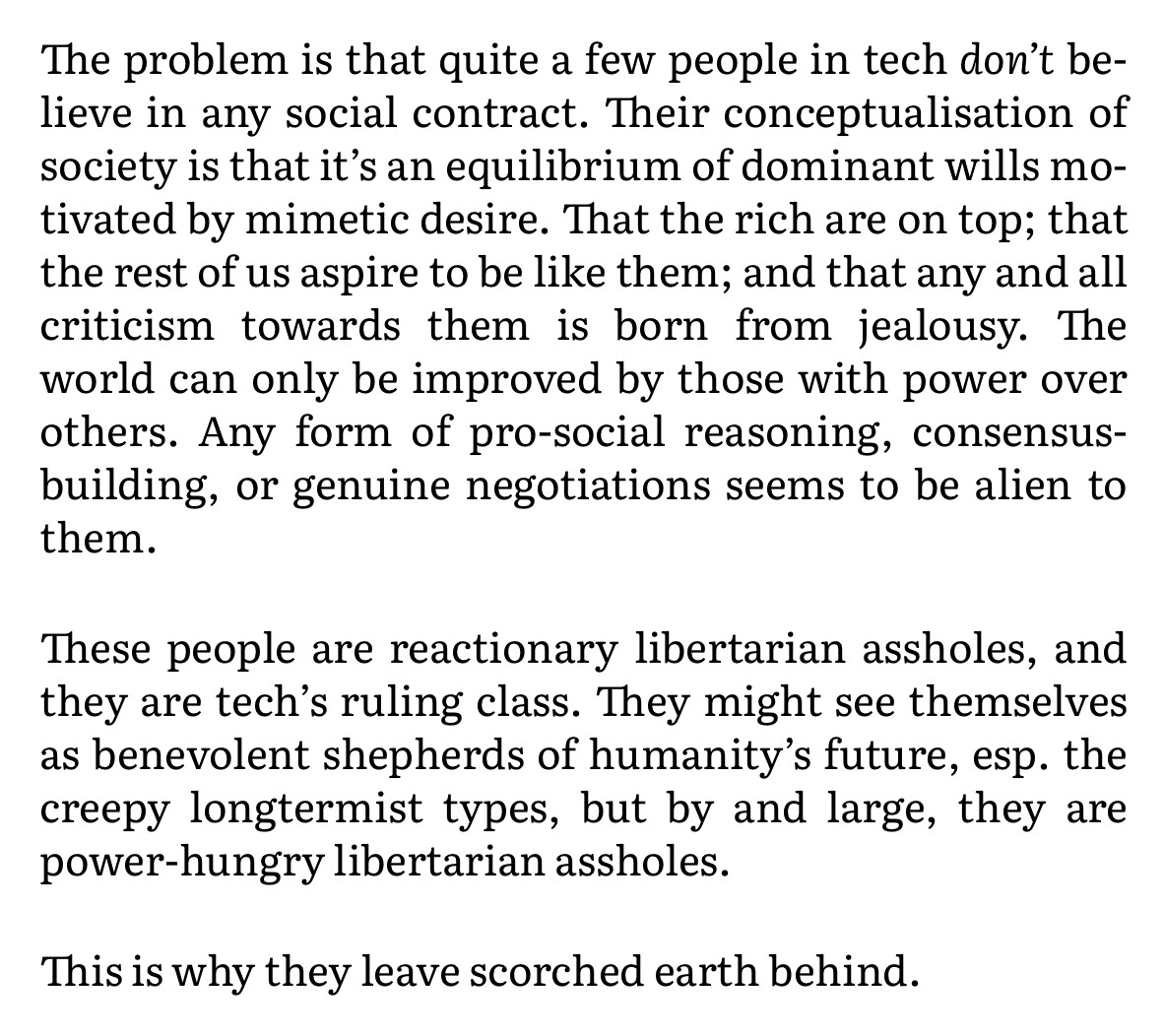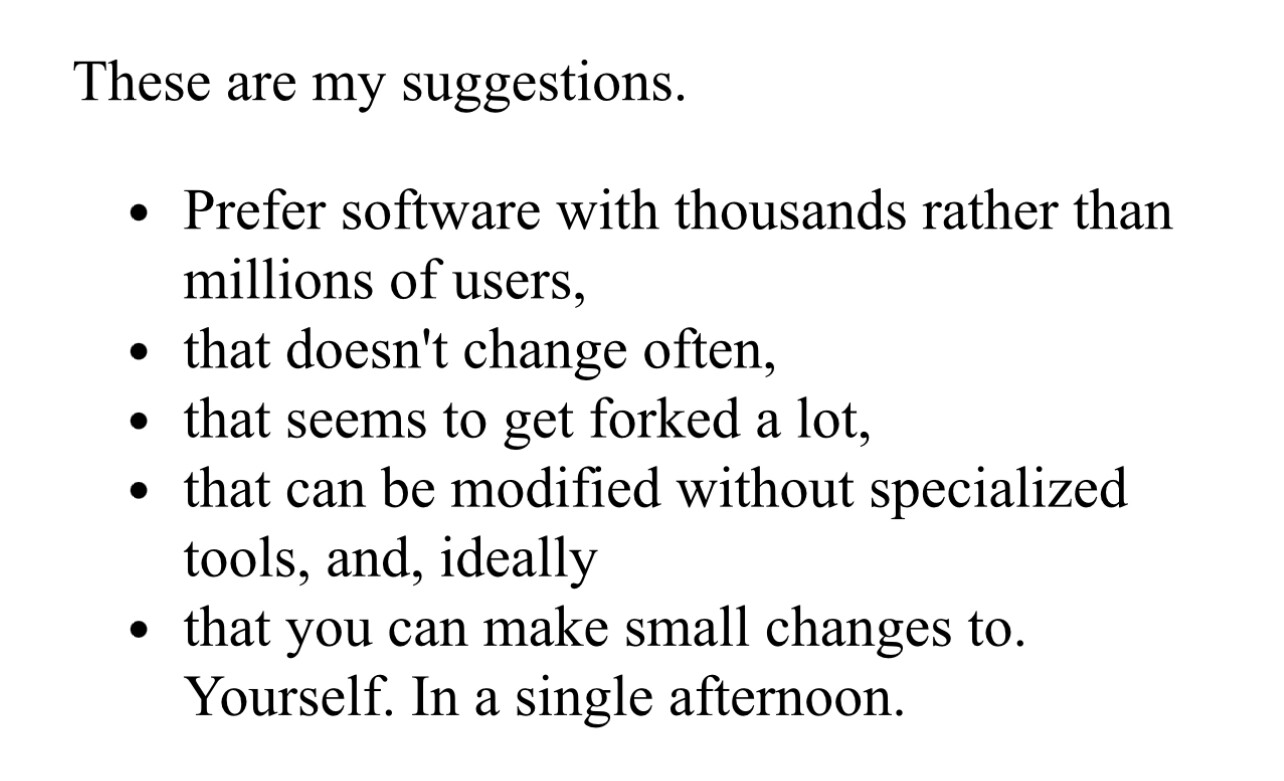@Alon @phillmv @pluralistic in the US, the central bank is the one part of the administrative state somewhat insulated from political sabotage, so we rely upon it, upon it alone almost, for macroeconomic management. activists often treat the Fed (rather than electeds) as the government worth lobbying (eg the campaign to have the Fed consider climate risk when regulating and risk-weighting bank lending).
@Alon @phillmv @pluralistic i mean, i want a private right of action to kill adtech, bc otherwise i suspect any reform will be even more toothless than GDPR has been in Europe. @pluralistic wants a private right of action, he’s not a lawyer, i think. mb we are somehow in thrall of the prestige of the legal lobby, but i think it’s mostly bc we know how effective litigation risk is at conditioning corporate behavior in the US. (often too effective!)
@Alon @phillmv @pluralistic (it sounds like the Arrangements Law, however neolliberal its direction, empowers the administrative state over electeds. in the US, the issue is that electeds kneecap, sometimes by intentional sabotage, other times by well-meaning micromanagement, the workings of the administrative state.)
@yarrriv @pluralistic it might not be enough, but doubling revenue would certainly help, be a good start! take any industry and assume its revenue declines by half and a major collapse is no surprise.
@Alon @phillmv @pluralistic but as you can see from this discussion, for better or worse, it’s not just lawyers. we have so lost confidence in a competent administrative state capable of opposing plutocratic interests that we (citizens, activists) actively seek private rights of action. we want to be able to do it ourself because we expect the administrative state to sell us out.
@Alon @phillmv @pluralistic yes, they can work when the state overcomes plutocratic interests to act. but, empirically, at the moment, the American administrative state mostly does not. one state out of fifty is the exception that proves the rule, re wage theft. I could speculate why Israel maybe does better — parliamentary systems in general better insulate administrative states from bad politicians — but your speculations will be better informed.
@Alon @phillmv @pluralistic i think a way to think about all this is private rights of action are very rigid and limit govt flexibility, but they are also very certain. in a world with perfect govt, there’d be little use for them. in lots of eg environmental and planning contexts, they do mischief. 1/
@Alon @phillmv @pluralistic but in contexts where the issue is likely underenforcement by the plutocratic state, and where costs of enforcement despite an inability of the state to balance or make tradeoffs against other interests are low, private rights of action are very useful. 2/
@Alon @phillmv @pluralistic if we had a capable administrative state in the US reliably willing to exert state power in favor of a balanced notion of the public interest over plutocratic interests, i’d agree private rights of action should be minimized to very clear, old-fashioned torts. but we don’t in fact have that. 3/
@Alon @phillmv @pluralistic if we wanted a balanced approach to surveillance-based advertising, under which dedicated professionals trade-off the virtues of targeting against the costs of surveillance and sought careful balances, then one shouldn’t favor a private right of action. 4/
@Alon @phillmv @pluralistic but the actual circumstance is the United States’ administration state is substantially hobbled by deference to plutocratoc interest, and there is very little public interest to balance against the harms of ad-tech-driven commercial surveillance. 5/
@Alon @phillmv @pluralistic so it seems to me that, despite the (very real!) flaws of private rights of action in the general case, they are well suited to this application. we intend to bluntly impair our collective capacity to surveil, and ensure existing infrastructure is disemployed. things that have been (mostly) unintended consequences in a planning and development context are the intended consequences here. /fin
“we need a legal ban on ads, not mere platitudes on billboards advertising companies' ‘respect’ for our privacy. The US is way overdue for a federal privacy law with a private right of action, which would let you and me sue the companies who violated it” @pluralistic https://pluralistic.net/2023/05/31/context-ads/
from @baldur https://www.baldurbjarnason.com/2023/tech-broke-the-webs-social-contract/ ht @emilybache @matthewskelton
 Text: The problem is that quite a few people in tech don't believe in any social contract. Their conceptualisation of society is that it's an equilibrium of dominant wills motivated by mimetic desire. That the rich are on top; that the rest of us aspire to be like them; and that any and all criticism towards them is born from jealousy. The world can only be improved by those with power over others. Any form of pro-social reasoning, consensus-building, or genuine negotiations seems to be alien to them. These people are reactionary libertarian assholes, and they are tech's ruling class. They might see themselves as benevolent shepherds of humanity's future, esp. the creepy longtermist types, but by and large, they are power-hungry libertarian assholes. This is why they leave scorched earth behind.
Text: The problem is that quite a few people in tech don't believe in any social contract. Their conceptualisation of society is that it's an equilibrium of dominant wills motivated by mimetic desire. That the rich are on top; that the rest of us aspire to be like them; and that any and all criticism towards them is born from jealousy. The world can only be improved by those with power over others. Any form of pro-social reasoning, consensus-building, or genuine negotiations seems to be alien to them. These people are reactionary libertarian assholes, and they are tech's ruling class. They might see themselves as benevolent shepherds of humanity's future, esp. the creepy longtermist types, but by and large, they are power-hungry libertarian assholes. This is why they leave scorched earth behind.
@djc that’s making claims (i can’t evaluate now) about current price growth attributable to profits.
profit margins have been on a secular tear, then supercharged postpandemic. this measure would be about 8% to be historically moderate-ish. i think it’s still around double that (can’t track it down now, on the road).
it isn’t full employment until profit margins are moderate.
from @akkartik on “situated software”. (i may have hit this before, but i love the aesthetic.) http://akkartik.name/freewheeling
it’s not just intuit’s lobbying. if filing were automatic and refunds just appeared for most workers, it’d be hard to persuade them to hate the IRS despite their interest in escaping predatory plutocracy.
@rst horror is a versatile genre.
@rst next time go for The Shinjng! how were the halls?
kind of disconcerting when your departure gate is F8.
maybe we should call instagram the fadiverse.
@DeanBaker13 @hardindr there may be a kind of irony, states whose reproductive and cultural politics drive away scarce US doctors may be the first to (usefully!) innovate by attracting qualified foreign professionals to replace them.
Clinical trials have become an excuse to create barriers to entry and protect massive pharma rents.
Perhaps we should consider nationalizing the clinical trials process. If an otherwise unencumbered treatment looks promising, the government should just pay to check it out. If it works, every competent firm can compete to offer it.
cf proprietary poop @ $20K a pop per @pluralistic https://pluralistic.net/2023/05/29/monopolizing-turds/

